Book contents
- Frontmatter
- Contents
- Acknowledgments
- Introduction: Mania as rhetoric
- PART I DEFIANT VOICE
- 1 “Howle, you great ones”: enthusiastic subjectivity as class rhetoric
- 2 “A huge loud voice”: levelling and the gendered body politic
- 3 Strange acts and prophetic pranks: apocalypse as process in Abiezer Coppe
- PART II PATRICIAN DIAGNOSIS
- PART III CHALLENGING LIMINALITY
- Epilogue: Beyond pathology
- Index
- CAMBRIDGE STUDIES IN EIGHTEENTH-CENTURY ENGLISH LITERATURE AND THOUGHT
3 - Strange acts and prophetic pranks: apocalypse as process in Abiezer Coppe
Published online by Cambridge University Press: 16 September 2009
- Frontmatter
- Contents
- Acknowledgments
- Introduction: Mania as rhetoric
- PART I DEFIANT VOICE
- 1 “Howle, you great ones”: enthusiastic subjectivity as class rhetoric
- 2 “A huge loud voice”: levelling and the gendered body politic
- 3 Strange acts and prophetic pranks: apocalypse as process in Abiezer Coppe
- PART II PATRICIAN DIAGNOSIS
- PART III CHALLENGING LIMINALITY
- Epilogue: Beyond pathology
- Index
- CAMBRIDGE STUDIES IN EIGHTEENTH-CENTURY ENGLISH LITERATURE AND THOUGHT
Summary
I am about my act, my strange act, my worke, my strange worke, that whosoever hears of it, both his ears shall tingle.
Abiezer Coppe, A Second Fiery Flying RouleJust as the Quakers “thee'd” and “thou'd” everyone, regardless of their rank, so Abiezer Coppe begins the preface to his A Fiery Flying Roll with a tone of startling familiarity:
My Deare One.
All or None.
Everyone under the Sunne.
Mine own.
My most Excellent Majesty (in me) hath strangely and variously transformed this forme.
And behold, by mine owne Almightinesse (In me) I have been changed in a moment, in the twinkling of an eye, at the sound of the Trump.
This amazing entrance, highly effective in its abrupt, staccato sentence fragments, violates every “proper” form of address. Coppe begins, in a tone of knowing and paternal benevolence, with “My Deare One.” The next address – “All or none” – implies a supreme indifference as to who in particular might be listening. Shifting again to “Every one under the Sunne,” Coppe in five words levels all social distinctions. His fond “Mine own,” like “My Deare One,” seems to presume an almost omniscient knowledge of the reader, a knowledge that confers possession. It is a mode of address that seemingly incorporates its interlocutors, whether they will or no, into its own world.
Coppe's rhetoric is more precisely seen, however, as deliberately mediating between two apparently incommensurable worlds.
- Type
- Chapter
- Information
- Mania and Literary StyleThe Rhetoric of Enthusiasm from the Ranters to Christopher Smart, pp. 77 - 98Publisher: Cambridge University PressPrint publication year: 1996

